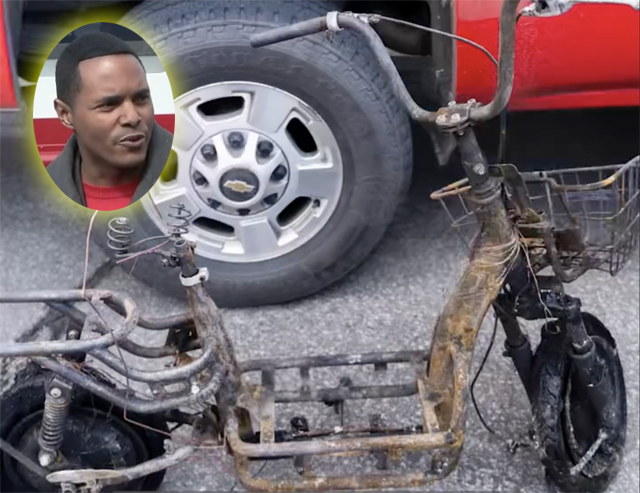The federal government must establish safety standards for lithium-ion batteries and even use its Homeland Security and Border Patrol agencies to keep substandard power packs from getting into the country, a Bronx member of Congress said yesterday.
Amid an increase in documented fires caused by the powerful batteries, Rep. Ritchie Torres introduced legislation to require the Consumer Product Safety Commission to establish safety standards for the batteries, a move, he said, would protect New Yorkers, including the city’s nearly 65,000 delivery workers who rely on the batteries to power the electric mobility devices that are essential for their jobs.
“My legislation … is an expression of the government’s highest obligation, which is public safety,” said Torres, whose borough experienced yet another fire over the weekend, when seven people were injured and a neighborhood grocery store and Laundromat were reduced to rubble.
BREAKING: I am introducing a bill mandating safety standards for the manufacturing of e-bikes and e-scooters with lithium-ion batteries.
In NYC, lithium-ion batteries have caused more than 400 fires in 4 years. That must change. pic.twitter.com/C0lAFTP8lf
— Ritchie Torres (@RitchieTorres) March 7, 2023
Though not in his bill, Torres also called on the U.S. Customs and Border Patrol and the Department of Homeland Security to prevent defective or uncertified batteries, such as those not inspected by the internationally known Underwriters Laboratory, from entering country.
“We must hold manufacturers accountable for producing safer devices and safer batteries [and] hold online marketplaces accountable for preventing the sale of dangerous bikes and devices,” Torres said. “And Customs and Border Patrol and DHS [must block] the importation of these dangerous devices.”
Torres’s call echos one made by the FDNY last month, which similarly asking for the Consumer Product Safety Commission, which has limited power, to intervene. FDNY Commissioner Laura Kavanagh wrote that the consumer regulator should “be proactive in … seizing imported devices at the ports that fail minimum industry standards, levying penalties against manufacturers who fail to inform [regulators] of hazards posed by their products, and seeking additional recalls of unsafe products.”
So far this year, there have been 33 fires that the FDNY attributes to lithium-ion batteries, causing 42 injuries and two fatalities. Last year, 216 fires caused 147 injuries and six fatalities, according to city stats. But the FDNY has not been able to determine how many of the fires were associated with electric bikes as opposed to other ubiquitous items like laptops, mopeds, scooters, or iPhones. Electric Citi Bikes, for example, use lithium-ion batteries yet have had no reported fires in the past two years, but then again, the Citi Bike fleet uses certified batteries that are recharged in a controlled setting.
Nonetheless, Kavanagh has repeatedly referred to the fires caused by lithium-ion batteries as “e-bike fires.”
But according to her agency’s own footage from the most recent inferno, it’s clear that what sparked the blaze was not an e-bike, but some sort of moped or sit-down scooter, which have larger batteries — a crucial difference noted in Streetsblog’s seminal Field Guide to Micro-Mobility.
Yesterday, an e-bike battery started a five-alarm fire that destroyed a Bronx supermarket located on Grand Concourse and 181st Street. If you have an e-mobility device, check to see if your device is UL tested and certified. For more safety tips visit https://t.co/NpwdRdlElY pic.twitter.com/gSmvF0vQhC
— FDNY (@FDNY) March 6, 2023
Torres, on the other hand, was careful to point out that the devices themselves are not to blame, and that his legislation is going after manufacturers selling low-quality batteries, not those who use them. A certified battery can sometimes cost up to $1,000, experts and advocates have said.
“I want to be crystal clear. The problem is not the batteries per se. The problem arises when these lithium ion batteries are poorly designed, poorly manufactured and poorly handled,” he said.
Torres’s legislation comes after the City Council last week passed legislation banning the sale of both second-use batteries or ones that are not nationally recognized by an approved organization, such as Underwriters Laboratory. The Council also is taking up an even more innovative solution for getting the dangerous batteries off city streets: a citywide “buy back” program that would allow delivery workers to swap faulty, damaged or second-hand batteries for safe, certified ones.






